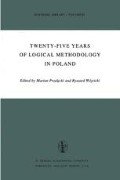Abstract
The main object of our analysis is Suppes’s well-known criterion of empirical meaningfulness for quantitative statements proposed in Suppes (1959), and our main purpose is to show this criterion to be a particular instance of some general criterion of empirical meaningfulness applicable to arbitrary statements. Such a criterion has been put forward in Przelęcki (1969). It is based on the same fundamental idea that underlies Suppes’s criterion: a connection between meaningfulness and invariance in truth value of a given statement. The criterion is applicable to all empirical languages that can be formalized within first-order predicate logic.
Reprinted from Synthese 26 (1974), D. Reidel Publishing Company, Dordrecht-Holland.
Access this chapter
Tax calculation will be finalised at checkout
Purchases are for personal use only
Preview
Unable to display preview. Download preview PDF.
Bibliography
M. Przelecki, The Logic of Empirical Theories, Routledge and Kegan Paul, London 1969.
J. D. Sneed, The Logical Structure of Mathematical Physics, D. Reidel, Dordrecht 1971.
P. Suppes, ‘A Set of Independent Axioms for Extensive Quantities’, Portugaliae Mathematica 10 (1951), 163–172.
P. Suppes, ‘Measurement, Empirical Meaningfulness, and Three-Valued Logic’, in Measurement: Definitions and Theories (ed. by C. W. Churchman and P. Ratoosh), Wiley, New York 1959, pp. 129–143.
References
For a closer examination of the kind of interpretation characteristic of empirical languages see Przełęcki (1969).
The notions of EM1 and EM2 defined above coincide with those of DT1 and DT2 as defined in Przełęcki (1969) provided the set P 0 contains nothing but taur tologies.
Although two kinds of variables are used in L 0 and L1 as characterized above (and, consequently, two domains appear in their models), the languages may easily be modified to conform to the general pattern described in Section I: that of a one-sorted language formalized within first-order predicate logic.
The original definition in Suppes (1959) abstracts from any connections between the mass function m and the empirical relations corresponding to terms R and O. Therefore it lacks the clauses requiring that should be a model of P o and of P1.
See e.g. Suppes (1951), (1959), and Sneed (1971), p. 86.
Editor information
Rights and permissions
Copyright information
© 1977 PWN - Polish Scientific Publishers - Warszawa
About this chapter
Cite this chapter
Przełęcki, M. (1977). Empirical Meaningfulness of Quantitative Statements. In: Przełęcki, M., Wójcicki, R. (eds) Twenty-Five Years of Logical Methodology in Poland. Synthese Library, vol 87. Springer, Dordrecht. https://doi.org/10.1007/978-94-010-1126-6_26
Download citation
DOI: https://doi.org/10.1007/978-94-010-1126-6_26
Publisher Name: Springer, Dordrecht
Print ISBN: 978-94-010-1128-0
Online ISBN: 978-94-010-1126-6
eBook Packages: Springer Book Archive

